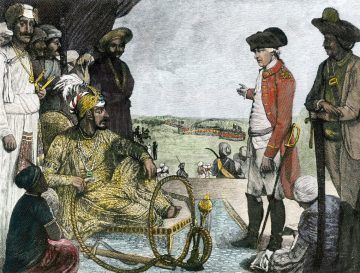Jason Burke at The Guardian:
 On 28 August 1608, Captain William Hawkins, a bluff British sailor, dropped anchor off Surat, a port on the western coast of the Indian subcontinent. India then had a population of around 150 million, around a fifth of the world’s total.
On 28 August 1608, Captain William Hawkins, a bluff British sailor, dropped anchor off Surat, a port on the western coast of the Indian subcontinent. India then had a population of around 150 million, around a fifth of the world’s total.
Many were ruled by the Mughal empire, a regional superpower that had seized Delhi and much of the north of India two centuries earlier. When Hawkins arrived, this immensely impressive dynasty had 4 million men under arms. When slighted by Portuguese merchant adventurers who built unauthorised fortifications around trading posts at the mouth of the Ganges, the emperor swept the Europeans into the river with embarrassing ease. Mughal capitals were busy with traders, artists, poets, aristocrats, warriors and clerics, all of whom contributed to the flow of around £100m annually, equivalent to roughly £10bn today, to the imperial exchequer in the northern city.
more here.
